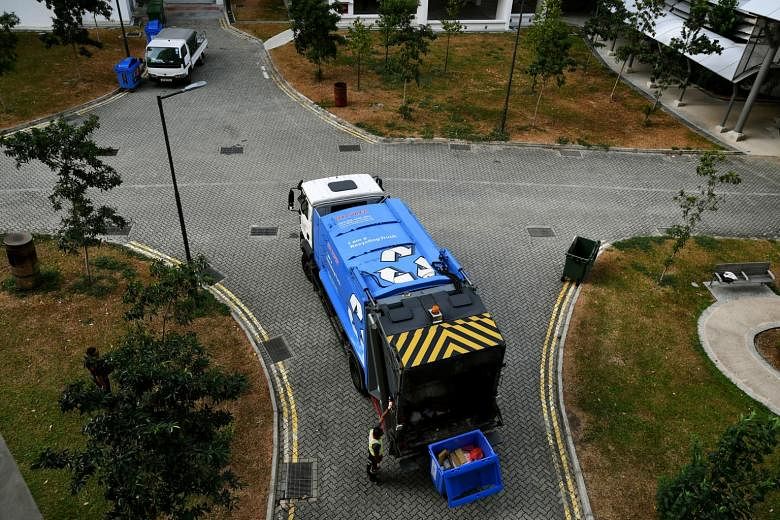Rank-and-file workers in waste management and recycling are one step closer to having better wages tied to a skills development ladder, after the labour movement proposed setting up a tripartite committee to look into implementing a progressive wage model for the sector.
National Trades Union Congress (NTUC) assistant secretary-general Zainal Sapari, disclosing the development yesterday, said the proposal was sent to the Ministry of Manpower on May 27, after getting buy-in from the Waste Management and Recycling Association of Singapore, which represents 166 companies in the sector.
Some 5,000 rank-and-file workers from the sector, such as garbage truck drivers and refuse sorters, stand to benefit when the progressive wage model is implemented, said NTUC secretary-general Ng Chee Meng.
The median wage of such workers is around $2,000, said association chairman Melissa Tan.
She added that companies in the waste management sector, which employs some 16,000 workers, a sizeable number of whom are foreigners, have found it an uphill task to attract Singaporeans as the sector suffers from a reputation problem.
New possibilities could open up for workers if a progressive wage model is introduced for the sector, Mr Ng and Mr Zainal said during a visit to waste management company Wah & Hua in Kranji Crescent yesterday.
The tripartite committee, which will bring together unions, employers and the Government, is set to be chaired by NTUC operations and mobilisation division secretariat director and Marine Parade GRC MP Mohd Fahmi Aliman, while discussions are under way on picking other representatives.
Described as a minimum wage tied to a skills ladder, the progressive wage model had its merits and drawbacks aired in Parliament last week.
The Workers' Party said the model has been implemented too slowly, and has pushed for a universal minimum wage of $1,300 instead.
Since it was first mooted in 2012, the progressive wage model has been rolled out in the cleaning, security and landscaping sectors.
But the Government cited figures to show that the model has helped lift the wages of 80,000 cleaners, security guards and landscape workers by 30 per cent in recent years, and is also more sustainable as it is implemented only with the support of companies in the sector.
Ms Tan, who is general manager at Wah & Hua, said the progressive wage model will be a way to help boost the image of the industry by improving the prospects of workers and also upping productivity.
Her company's workforce is made up of 60 per cent Singaporeans and 40 per cent foreigners.
Asked about the recent debate on the progressive wage model and minimum wage, Mr Ng said that in the long run, NTUC hopes to raise the wages of workers in different sectors not just through the progressive wage model, but also by "looking at the total possibilities for workers".
Elaborating, he said that the progressive wage model, working in concert with the Workfare Income Supplement scheme, which tops up the wages of lower-wage workers, has helped to improve the lot of workers without employers having to solely bear the burden of raising wages.
With the Government stepping in to top up wages first with the Workfare Income Supplement, employers can improve productivity so that the entire industry progresses and workers can be paid more, he said.
Speaking in Mandarin, he said pushing for a higher wage without considering the realities of the industry would be akin to protecting the rice bowls of workers but breaking the rice jars of employers.
If the higher pay is not sustainable, companies would close down and workers would be left without a job, he added.


